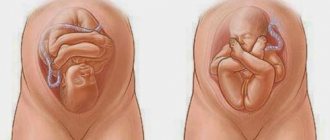Why does my stomach gurgle?
The female body is subject to various changes during pregnancy, but you should not treat them all with danger. For example, if your stomach is seething during pregnancy, you must first establish the causes of this phenomenon.
Perhaps these are wasted worries. But in some cases, this phenomenon can be dangerous for the health of the mother and child, so it is worth contacting a qualified specialist and carrying out treatment measures.
Causes of stomach turmoil during pregnancy
Pregnant women often experience rumbling, gas, and bloating. Each of us is familiar with similar symptoms.
However, churning in the stomach during pregnancy can occur so often that the expectant mother begins to think about possible health problems. This phenomenon, in addition to worries, causes inconvenience and discomfort, both to the expectant mother herself and to the people close to her.
Naturally, every woman wants to get rid of it, but to do this, the cause of the problem must be determined.
Sometimes unusual events during pregnancy may not have dangerous consequences for the fetus, but in other cases it is the opposite. Such phenomena include gurgling (rumbling) in the stomach of the expectant mother. When is it not dangerous, and in what cases is it a symptom of a serious problem?
When gurgling is safe
From time to time, each of us hears some sounds in the stomach, which are usually called rumbling. They appear and then go somewhere.
For stomach rumbling, doctors coined the term “borborygmus” (plural: “borborygmi”). The translation of this word is unclear. This word is believed to have been specially coined to imitate the sounds of a hungry person's stomach growling.
Causes of rumbling in the stomach
The most common reason why the stomach growls is hunger. In this case, the sounds remind the person that it is time for him to eat.
Rumbling in the stomach after eating, on a full stomach, also occurs: for example, when overeating, especially after a long period without food.
The stomach also rumbles after eating heavy and/or unhealthy food, as well as after eating certain foods (individual for each person), after drinking alcohol, carbonated drinks.
The reason may be more serious - some diseases of the gastrointestinal tract (dysbacteriosis, intestinal obstruction, chronic colitis, chronic gastritis, diverticulitis). Rumbling in this case is one of the symptoms of the disease. The most common reason why the stomach growls among diseases is dysbacteriosis.
Some people also experience rumbling sounds when they are nervous.
Sometimes unusual events during pregnancy may not have dangerous consequences for the fetus, but in other cases it is the opposite. Such phenomena include gurgling (rumbling) in the stomach of the expectant mother. When is it not dangerous, and in what cases is it a symptom of a serious problem?
What diseases may this indicate?
In some cases, rumbling in the stomach is one of the symptoms of disease development.
- Dysbacteriosis (disturbance in the composition of normal flora in the intestines) occurs against the background of taking antibiotics, poor nutrition, diets and, in addition to rumbling, leads to a state of discomfort, bloating, pain, flatulence,
- With gastritis, there is a systematic rumbling after eating, indicating improper functioning of the stomach or intestines,
- Irritable bowel syndrome , also associated with discomfort and defecation disorders (diarrhea, constipation),
- Infectious process associated with the consumption of food that has spoiled or is contaminated with toxins and microorganisms (bacteria, viruses, fungi),
- Pancreatitis , in which stomach rumbling occurs due to a lack of digestive enzymes synthesized by the pancreas,
- Colitis associated with damage to the intestinal mucosa and the occurrence of an inflammatory process,
- Cholecystitis is an inflammatory disease of the gallbladder, when rumbling is localized in the right side,
- Poisoning , which is accompanied by abdominal pain and stool upset.
Expert advice
In this situation, you do not need to treat yourself. If
If you act incorrectly, you can harm your unborn baby. It is best to consult a doctor at the first symptoms, who will identify the cause of the discomfort in the abdomen.
In some cases, such unpleasant signs are evidence that a woman has gastrointestinal diseases.
If the expectant mother suffered from gastritis, enteritis, ulcers or pancreatitis before pregnancy, the doctor will prescribe a special examination for her and select an appropriate diet.
If gurgling in the stomach appears due to improper food and non-compliance with the regime, then this phenomenon can be eliminated simply by adjusting the diet.
First of all, the expectant mother should remove (or reduce to a minimum) all heavy foods from her daily menu. These include: beans, peas, baked goods, sweets, eggs. In addition, it is not recommended to mix carbohydrates with proteins in the same plate.
While waiting for your baby, you should avoid eating foods that increase gas formation and stressful situations (they can also lead to flatulence).
Treatment of polyhydramnios
Gurgling in the stomach is not always caused by poor nutrition. In some cases, this phenomenon may be a symptom of a dangerous condition - polyhydramnios. This pathology is characterized by an excess of amniotic fluid.
If a pregnant woman has exceeded the norm of amniotic fluid, then, in addition to the fact that gurgling may be felt, there is weakness throughout the body, discomfort in the abdomen in the form of pain and heaviness, and malaise.
Polyhydramnios often contributes to the appearance of rough stretch marks. The gurgling itself is called “fluctuation”. Polyhydramnios has both chronic and acute forms.
Only after an ultrasound examination is performed, the gynecologist can confirm or refute the diagnosis of multiple births.
An expectant mother with such a pathological condition must constantly be in the hospital. Pregnancy is maintained only if the woman does not exhibit symptoms of severe respiratory and circulatory disorders. If there is even the slightest threat to the life of the expectant mother, then early delivery is carried out.
The necessary therapy is to strengthen the body with vitamins. In addition, treatment with diuretics and antibiotics is prescribed. If there is a suspicion of weak labor, then the medical institution may prescribe intensive therapy.
The expectant mother should remember that she does not need to independently determine the causes of gurgling in the stomach. This should be done by a competent doctor. Based on the results of the examination, he will be able to decide how dangerous or safe this condition is and whether treatment will be needed.
The female body is subject to various changes during pregnancy, but you should not treat them all with danger. For example, if your stomach is seething during pregnancy, you must first establish the causes of this phenomenon. Perhaps these are wasted worries. But in some cases, this phenomenon can be dangerous for the health of the mother and child, so it is worth contacting a qualified specialist and carrying out treatment measures.
Causes of stomach turmoil during pregnancy
Pregnant women often experience rumbling, gas, and bloating. Each of us is familiar with similar symptoms. However, churning in the stomach during pregnancy can occur so often that the expectant mother begins to think about possible health problems. This phenomenon, in addition to worries, causes inconvenience and discomfort, both to the expectant mother herself and to the people close to her. Naturally, every woman wants to get rid of it, but to do this, the cause of the problem must be determined.
In medical practice, seething in the stomach is called flatulence, which appears due to gas formation. As a result, a person feels bloated. Sometimes rumbling in the stomach during pregnancy is painful in varying degrees of intensity. Absolutely every pregnant woman faces the problem of bloating, constipation, and seething, even if she has not previously experienced gastrointestinal disorders. All this is associated with hormonal imbalances, which is especially common in the last stages. This period is characterized by active growth of the uterus, which puts acute pressure on the intestines, which is why rumbling in the stomach appears during pregnancy.
Find out why doctors do not recommend taking a bath for pregnant women.
Why buy a special bra during pregnancy and what it should be like, you can read here.
The root cause of the occurrence is improper food intake. When a woman chews, she must make sure that air does not get in with the food, since it is because of this that gases are formed and the stomach growls during pregnancy. You can’t eat too quickly; it’s better to set aside free time to eat calmly and without rushing. You need to eat more often and in small doses. The problem can be solved if you remove various sauces, strong tea, sweet foods, coffee, cabbage, pears, and legumes from your diet.
Frequent use of chewing gum is also a cause. When chewing, the stomach secretes gastric juice, which helps digest the food received, but it does not enter inside. Another important reason is stress, anxiety, excessive physical activity, and hunger.
Advice: to try to get rid of unpleasant sensations on your own, you need to eat properly, your diet should consist only of healthy foods, and you should not do heavy physical exercise. You need to rest more, walk in the fresh air, listen to relaxing music.
When should you see a doctor?
To find out the cause, you need to determine the area of localization of discomfort:
- in the upper abdomen;
- on the right or left side of the abdomen;
- in the stomach area;
- in the gallbladder;
- in the area of the sigmoid colon (lower abdomen);
- in the duodenum.
When gurgling is safe
Even a woman who has never had problems with the gastrointestinal tract before pregnancy may experience bloating, rumbling, constipation, gas formation and other problems. All this is due to hormonal changes in the female body at the beginning of pregnancy. Such problems can also occur late in pregnancy, when the growing uterus puts pressure on the intestines. Improper and increased nutrition of a pregnant woman can intensify these symptoms. In this case, the problem of rumbling in the intestines can be solved by giving up sweet foods and sugar substitutes, strong teas and various sauces. You need to eat in smaller portions and often. Also in such cases, doctors may recommend special exercises that improve intestinal motility.
In some cases, gurgling can be a signal of dysbiosis - a violation of the intestinal microflora. When this microflora changes to pathogenic, then bloating and rumbling begin. In this case, pain in the navel area is also possible. Then the woman turns to a gynecologist, who refers her to a gastroenterologist. He will prescribe appropriate treatment. Usually, with such causes of gurgling in the stomach, there is no threat to the fetus.
Methods to combat stomach rumbling during pregnancy
If seething, rumbling and bloating occur frequently and cause great inconvenience, you can take some measures to help get rid of the problem.
If your stomach often growls during pregnancy, the first thing you need to do is pay attention to your diet. Eliminate all products that cause gas formation, these are:
- cabbage;
- carbonated drinks;
- legumes;
- fresh pear;
- fresh apple;
- buns;
- fat meat;
- fried foods.
Doctors recommend taking activated charcoal or Sorbex three times a day, devoting time to gymnastics every day, but do not overdo it with physical exercise. Instead of strong tea, it is better to make a chamomile infusion. Decoctions of caraway seeds, fennel, carrots or dried parsley roots are well suited as a medicine. You need to brew at the rate of 2 teaspoons of seeds per 500 ml of boiling water. Take 2 tablespoons every hour.
A pregnant woman should always remember that the causes of stomach turmoil can only be determined by the observing doctor. Depending on the symptoms, the individual characteristics of the body and the course of pregnancy, an accurate diagnosis is established. Based on the results, the degree of danger is determined, and appropriate methods are applied to combat the problem.
Causes of abdominal discomfort
During pregnancy, absolutely every woman can feel some kind of seething, constipation or bloating in her stomach. It can form even in cases where gastrointestinal problems have not previously been identified in the body. All factors considered are directly related to hormonal changes. The above signs can form and make themselves felt even in late pregnancy, that is, during the period when the enlarged uterus begins to actively and quite strongly put pressure on the intestines.
Among other things, increased symptoms can be closely associated with a woman’s poor diet. In this case, the problem can be resolved if you completely eliminate sweet foods, various sauces, strong teas and sugar substitutes from consumption. Nutrition should be as balanced as possible, often and in small portions. Medical experts often recommend performing gymnastics that can improve intestinal motility.
There are also moments when seething in the stomach indicates the presence of dysbiosis, that is, the formation of disturbances in the microflora of the immediate intestine. When the microflora changes to a pathogenic type, unpleasant bloating forms and the stomach begins to actively rumble. Among other things, some pain may appear in the umbilical region of the body. During pregnancy, a woman must consult a gynecologist who is treating and supervising the entire process. He, in turn, sends the expectant mother to a gastroenterologist. It is noted that such seething does not negatively affect the fetus.
What to do with such a problem?
Discomfort in the abdomen while expecting a baby is a common companion for a pregnant woman. The uterus increases in size and puts pressure on nearby organs. It also affects the intestines, and this contributes to the appearance of bloating and gurgling.
During pregnancy, the body begins
produce large amounts of progesterone, which provokes the appearance of flatulence. This hormone has a relaxing effect on the organs, preventing the uterus from contracting prematurely. As a result, bloating and gases form. In addition, pain in the head and heart may appear.
Hydrotherapy helps with such problems. It is imperative to include in your daily routine a set of gymnastic exercises that help activate the gastrointestinal tract.









